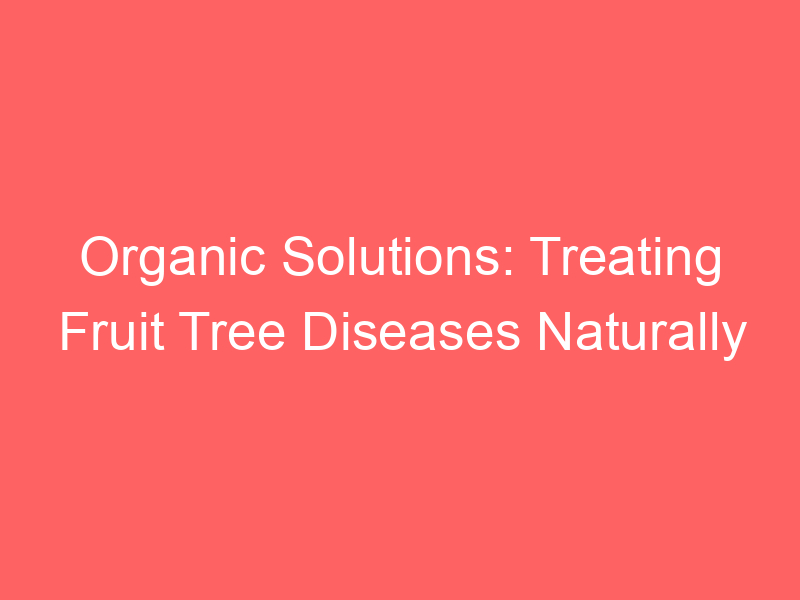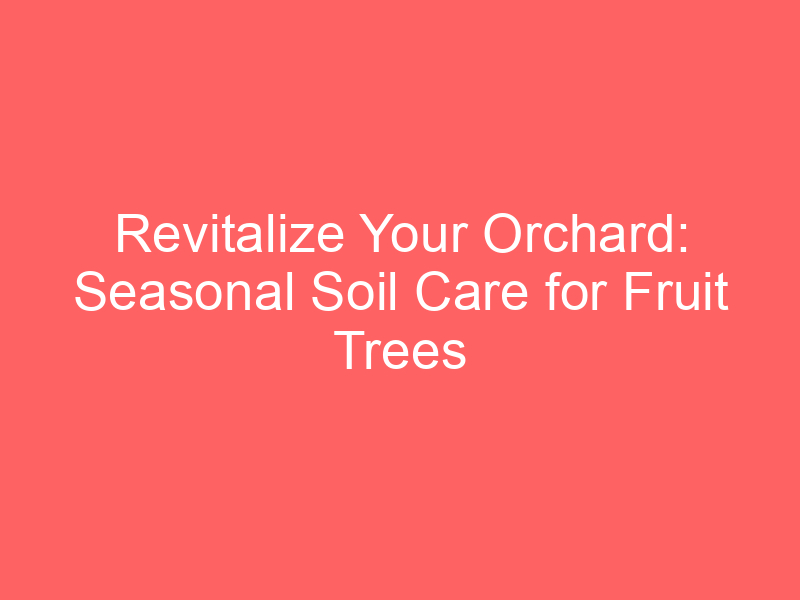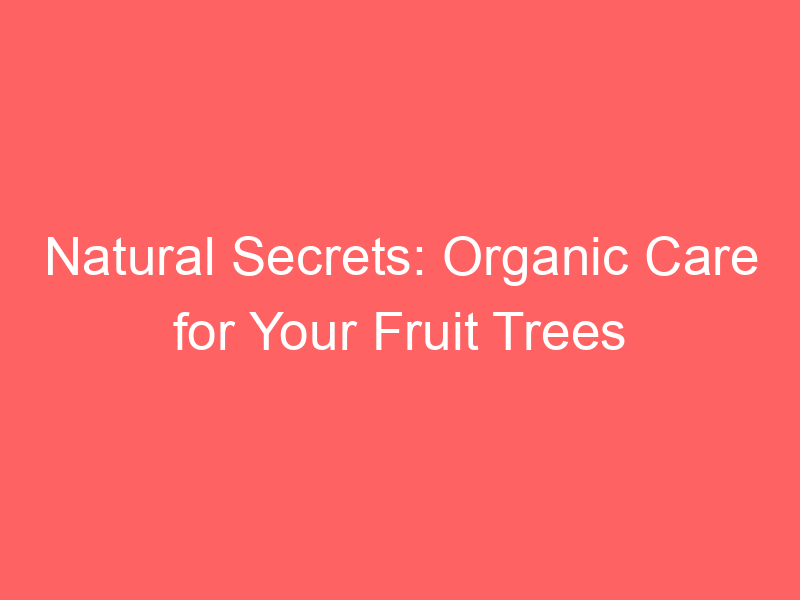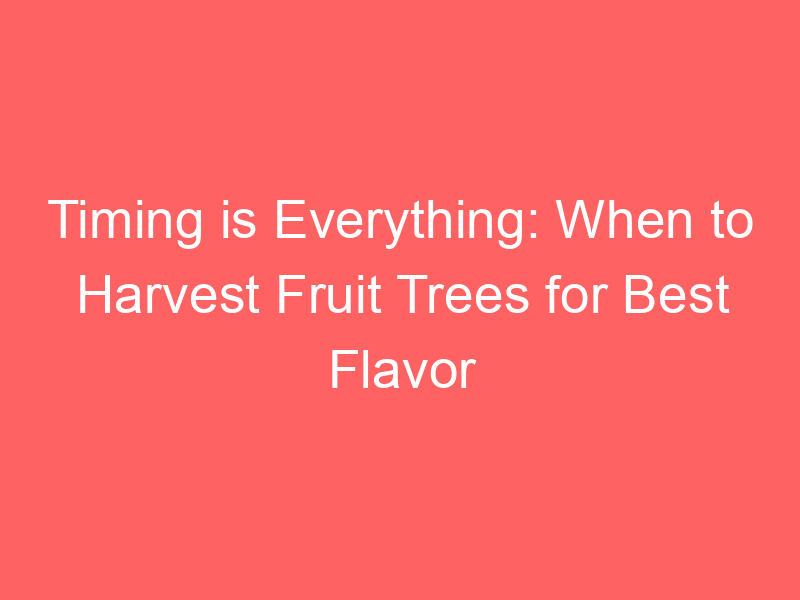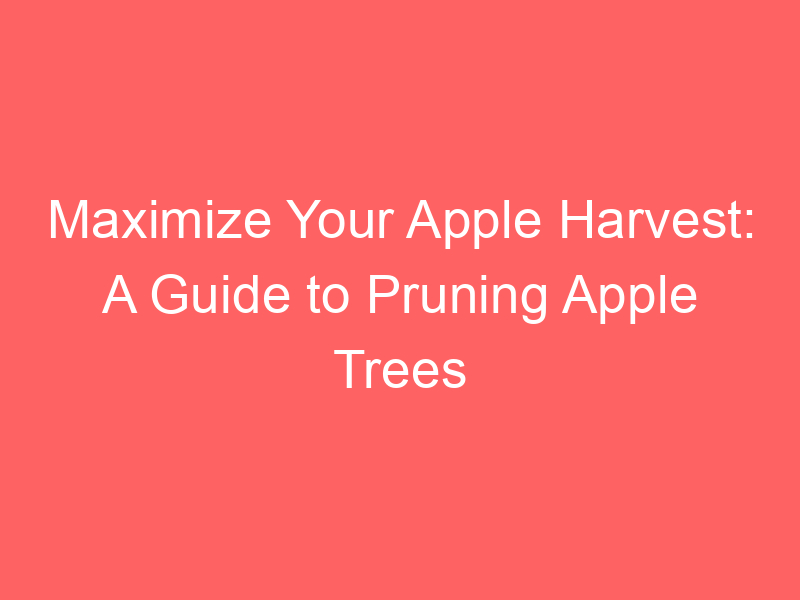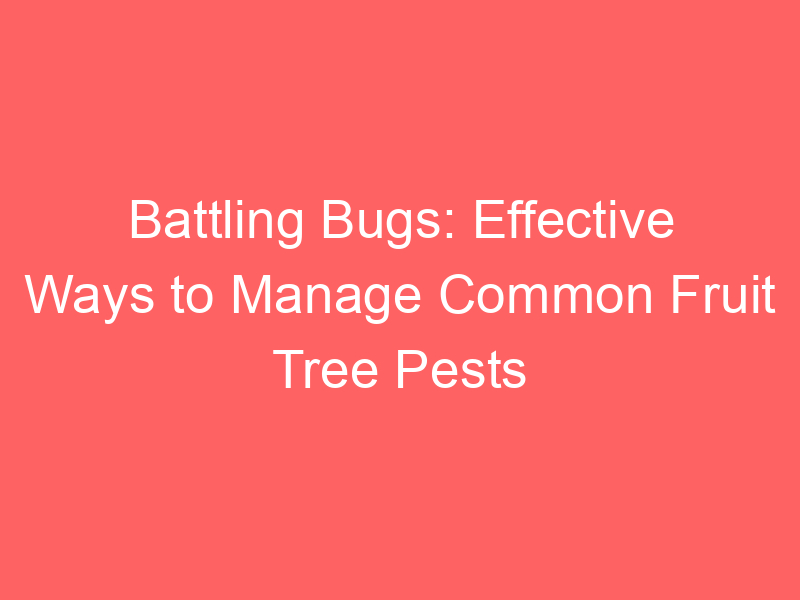Introduction to Organic Fruit Tree Care
Organic fruit tree care is an essential practice for any plant lover who wants to enjoy a bountiful harvest from their backyard. It’s all about using natural methods to grow healthy, delicious fruit. Let’s delve into the importance of organic gardening and the benefits it brings to your fruit trees.
- Understanding the Importance of Organic Gardening
- The Benefits of Organic Fruit Tree Care
Organic gardening is a method of growing plants without using synthetic fertilizers or pesticides. Instead, it relies on natural processes and materials to nourish the plants and protect them from pests and diseases. This approach is not only safer for the environment but also for the people who consume the fruits.
According to a Wikipedia article on organic farming, this method can enhance soil structure and biodiversity, leading to healthier plants. Organic gardening also reduces the risk of toxic chemicals entering our food chain, making the fruits you harvest safer to eat.
Organic fruit tree care comes with a host of benefits. First, it helps to maintain and improve the health of your fruit trees. By using organic methods, you’re providing your trees with the nutrients they need in a form that they can easily absorb. This leads to stronger, more resilient trees that produce high-quality fruit.
Second, organic fruit tree care is better for the environment. It reduces the amount of synthetic chemicals that can leach into the soil and water, protecting local ecosystems. Plus, it encourages biodiversity, as beneficial insects and other wildlife are not harmed by synthetic pesticides.
Lastly, the fruits produced through organic methods are often tastier and more nutritious. They are grown in a balanced, healthy environment, which can lead to better flavor and nutritional content.
In conclusion, organic fruit tree care is a rewarding practice that benefits not only your fruit trees but also the environment and your health. As we move forward, we’ll explore common fruit tree diseases and how to tackle them organically, ensuring your trees remain healthy and productive.
Common Fruit Tree Diseases
Keeping your fruit trees healthy and productive requires understanding the common diseases that can affect them. Let’s delve into some of these diseases and their impact on fruit trees.
- Identifying common fruit tree diseases
There are several diseases that can affect fruit trees. Here are a few common ones:
- Apple Scab: This disease, caused by the fungus Venturia inaequalis, affects apple trees. It creates dark, scaly lesions on the leaves, fruit, and twigs. Learn more about Apple Scab.
- Citrus Canker: This bacterial disease causes raised, corky lesions on the fruit, leaves, and stems of citrus trees. Learn more about Citrus Canker.
- Peach Leaf Curl: This fungal disease affects peach and nectarine trees. It causes the leaves to curl and change color. Learn more about Peach Leaf Curl.
- Understanding the impact of these diseases on fruit trees
These diseases can have a significant impact on the health and productivity of your fruit trees.
- Apple Scab: Infected trees produce less fruit and may eventually die if not treated.
- Citrus Canker: This disease can reduce the yield of citrus trees and make the fruit unsightly, though still edible.
- Peach Leaf Curl: Infected trees may produce less fruit and can become weakened, making them more susceptible to other diseases and pests.
Understanding these diseases and their impact can help you take the necessary steps to protect your fruit trees and ensure a healthy harvest. In the next section, we will discuss organic solutions for these common tree diseases.
Organic Solutions for Tree Diseases
When it comes to growing fruit trees, one of the most common challenges that gardeners face is dealing with tree diseases. However, there are organic solutions that can help you manage these diseases effectively. Let’s delve into the world of organic pest control for fruit trees.
Organic Pest Control for Fruit Trees
Pests can be a major cause of fruit tree diseases. By controlling these pests organically, you can prevent many common diseases that affect fruit trees. Let’s look at how pests play a role in fruit tree diseases and explore some natural remedies for pest control.
- Understanding the role of pests in fruit tree diseases
- Natural remedies for pest control
Pests are not just annoying; they can also cause serious damage to your fruit trees. Some pests, like aphids and scale insects, suck the sap from the tree, weakening it and making it more susceptible to diseases. Others, like the codling moth, burrow into the fruit, causing direct damage and opening pathways for disease-causing organisms. Understanding the role of pests in fruit tree diseases is the first step towards effective organic pest control.
There are many natural remedies that you can use for pest control. One of the most effective is the use of beneficial insects, such as ladybugs and lacewings, which prey on harmful pests. You can also use organic sprays made from ingredients like neem oil, garlic, or hot pepper, which deter pests without harming the tree or the environment. Another effective method is to use barriers and traps, such as sticky bands around the trunk to catch crawling pests, or pheromone traps to catch flying pests. Remember, the key to effective organic pest control is to use a combination of methods and to act early, before the pest population gets out of control.
By understanding the role of pests in fruit tree diseases and using natural remedies for pest control, you can protect your fruit trees from many common diseases and ensure a healthy, bountiful harvest.
Natural Remedies for Tree Diseases
When it comes to caring for your fruit trees, nature provides some of the best solutions. Here, we will explore how to cure fruit tree diseases using natural remedies and delve into a case study showcasing the successful use of organic solutions for tree diseases.
- How to Cure Fruit Tree Diseases Using Natural Remedies
- Garlic Spray: Garlic is known for its antifungal properties. A spray made from garlic can be used to treat fungal diseases in fruit trees. To make this spray, crush a few cloves of garlic and mix them with water. Spray this mixture on the affected areas of the tree.
- Neem Oil: Neem oil is a natural pesticide that can be used to treat a variety of tree diseases. It can be mixed with water and sprayed on the affected areas of the tree. Neem oil is safe for beneficial insects and does not harm the tree.
- Baking Soda: Baking soda is another natural remedy that can be used to treat fungal diseases. Mix one tablespoon of baking soda with a gallon of water and spray it on the affected areas.
- Case Study: Successful Use of Organic Solutions for Tree Diseases
There are several natural remedies that can help cure fruit tree diseases. These remedies are not only effective but also safe for the environment and your family.
Remember, consistency is key when using these natural remedies. Regular application can help control and eliminate the disease.
Let’s take a look at a real-life example of the successful use of organic solutions for tree diseases. A fruit farmer in California was struggling with a persistent fungal disease in his apple orchard. Traditional chemical pesticides were not only expensive but also harmful to the environment.
He decided to try a natural remedy – a mixture of neem oil and water. He sprayed this mixture on his trees every week. After a few months, he noticed a significant reduction in the disease. His apple trees were healthier and the fruit yield increased. This case study shows that natural remedies can be effective in treating tree diseases.
Using natural remedies for tree diseases is not only effective but also sustainable. It’s a great way to ensure the health of your fruit trees while also caring for the environment. So, why not give these natural remedies a try?
Fruit Tree Disease Prevention
Preventing diseases in your fruit trees is an essential part of maintaining a healthy home harvest. Here, we’ll discuss key strategies for keeping your trees healthy and preventing common diseases.
Healthy Fruit Tree Maintenance
Proper maintenance is the first step towards preventing diseases in your fruit trees. Here are some key takeaways and preventive measures you should consider:
- Key takeaways for maintaining healthy fruit trees:
- Regular Pruning: Regularly pruning your fruit trees helps to improve air circulation and sunlight penetration, which can prevent the growth of harmful fungi and bacteria.
- Proper Watering: Overwatering or underwatering can stress your trees and make them more susceptible to diseases. It’s important to water your trees appropriately based on their specific needs.
- Soil Health: Healthy soil is key for healthy trees. Regularly test your soil and amend it as needed to ensure it provides the nutrients your trees need.
- Preventive measures for fruit tree diseases:
- Regular Inspections: Regularly inspect your trees for signs of disease. Early detection can make treatment more effective.
- Use of Organic Fungicides: Organic fungicides can help prevent fungal diseases. Always follow the manufacturer’s instructions when applying these products.
- Proper Sanitation: Clean up fallen fruit and leaves from under your trees. These can harbor disease-causing organisms.
By following these guidelines, you can help ensure your fruit trees stay healthy and productive. Remember, prevention is always better than cure when it comes to fruit tree diseases.
Organic Gardening Tips
Organic gardening is a method of growing fruit trees that is not only beneficial to the environment but also to the health of the trees and the quality of the fruits they produce. Here are some best practices for organic gardening and how it helps in disease prevention.
- Best practices for organic gardening
- Soil Health: The health of your soil is crucial in organic gardening. Regularly add organic matter like compost or manure to improve soil fertility. Learn more about soil health here.
- Plant Diversity: Planting a variety of fruit trees can help prevent diseases and pests. Different plants attract different beneficial insects that can help keep pests in check.
- Natural Pest Control: Instead of using chemical pesticides, opt for natural methods like introducing beneficial insects, using homemade sprays, or planting pest-repelling plants.
- Watering: Water your trees deeply but infrequently to encourage deep root growth and prevent disease.
- How organic gardening helps in disease prevention
- Healthy Soil: Healthy soil produces strong, disease-resistant plants. By focusing on soil health, you can help prevent many common fruit tree diseases.
- Biodiversity: A diverse garden ecosystem can keep pest populations under control, reducing the risk of disease.
- Natural Pest Control: Natural pest control methods can help prevent diseases without the use of harmful chemicals that can damage the environment and potentially harm your trees.
Organic gardening involves a variety of practices that aim to create a healthy, sustainable ecosystem in your garden. Here are some key best practices:
Organic gardening can play a significant role in disease prevention in fruit trees. Here’s how:
By following these organic gardening tips, you can help ensure the health and productivity of your fruit trees while also contributing to a healthier environment.
Conclusion: The Future of Organic Fruit Tree Care
As we look towards the future, it’s clear that organic fruit tree care is not just a passing trend, but a sustainable solution for healthy and productive home orchards. Let’s explore the growing trend of organic solutions in gardening and our final thoughts on treating fruit tree diseases naturally.
- The Growing Trend of Organic Solutions in Gardening
- Final Thoughts on Treating Fruit Tree Diseases Naturally
Organic gardening is becoming increasingly popular as more people recognize its benefits for the environment and human health. According to a Wikipedia article, organic gardening avoids the use of synthetic fertilizers and pesticides, which can harm soil health and biodiversity. Instead, it focuses on building fertile soil and maintaining ecological balance. This approach is particularly beneficial for fruit trees, which require nutrient-rich soil to produce high-quality fruit.
Furthermore, a study by the National Gardening Association found that 35% of all households in America are growing food at home or in a community garden, up 200% in the last decade. This surge in home gardening is driving the demand for organic solutions that are safe and effective.
When it comes to treating fruit tree diseases, natural methods are proving to be a viable alternative to chemical treatments. These methods include using beneficial insects, fungi, and bacteria to control pests and diseases, as well as implementing cultural practices like proper pruning and sanitation to prevent disease spread.
As we move forward, it’s crucial to continue researching and promoting these organic methods. Not only do they help maintain the health of our fruit trees, but they also contribute to the overall well-being of our planet. Remember, every small step towards organic gardening is a leap towards a healthier and more sustainable world.
In conclusion, the future of organic fruit tree care is bright and promising. With the growing trend of organic solutions and the increasing interest in natural disease treatment, we are on the right path towards creating healthier and more productive home orchards. Let’s continue to nurture our fruit trees with care and respect for nature, and they will surely reward us with bountiful harvests for years to come.

